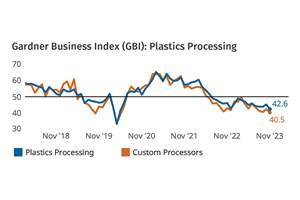The Recycling Partnership Calls for $500M to Transform U.S. Recycling System
The report calls for $500 million in funding by 2025 and is inspired and endorsed by the Ellen MacArthur Foundation’s (EMF) New Plastics Economy initiative.
The Recycling Partnership announced a roadmap aimed at addressing systemic issues in the U.S. recycling system and catalyzing the transition toward a circular economy for packaging. The Recycling Partnership is a nonprofiit organization that seeks to transform recycling for states, cities and communities across the U.S., and to empower companies to meet their own sustainability goals. The 48 current funding partners range from major brand owners (Coca-Cola, Pepsico, Amazon, Procter & Gamble and others) to resin producers (such as Dow, ExxonMobil and Indorama), large processors (Amcor, Berry Global, Dart, Sonoco, Graham Packaging), industry associations (including the Plastics Industry Association), and one government agency (EPA).

The report, “The Bridge to Circularity: Putting the ‘New Plastics Economy’ into Practice in the U.S.” is inspired and endorsed by the Ellen MacArthur Foundation.
According to “The Bridge to Circularity,” there is no single solution to transition to a circular economy–an economic system aimed at eliminating waste by design, keeping materials in use and regenerating natural systems. To build a bridge between the current system and an optimized circular system, The Recycling Partnership is calling for a set of concrete actions based on three issues currently undermining the U.S. recycling industry:
(1) The speed of packaging innovation has outpaced the capabilities of our recycling infrastructure. To meet the New Plastics Economy Global Commitment target that 100 percent of plastic packaging will be reusable, recyclable, or compostable by 2025, brands, organizations, and governments must align packaging with the realities of the current recycling system while also investing to advance the system.
“Pathway to Recyclability”: The Recycling Partnership is initiating a more granular process detailing how to move a package from technically recyclable to commonly accepted for recycling with partners such as Sustainable Packaging Coalition (SPC) and the Association of Plastic Recyclers (APR). Collaboratives are also being launched with the goal of optimizing the system for multiple materials and packaging formats, including but not exclusive to plastics.
(2) As it stands, the U.S. recycling system cannot deliver the supply of recycled materials demanded by the Global Commitment. In fact, the report uses the case study of polyethylene terephthalate (PET) bottle recycling and finds an annual gap of over one billion pounds between the current U.S. supply and projected demand for recycled PET (rPET) in bottles, and that is just one packaging material type among many. It will be impossible for many companies to meet their ambitious recycled content commitments without significant interventions in the recycling system.
“Unlocking Supply”: The Recycling Partnership will launch an industry-wide $250 million residential recycling intervention to capture more than 340 million pounds of post-consumer plastics, in addition to over 2 billion pounds of other packaging materials. The report identifies specific strategies to put the capital to immediate use to benefit U.S. communities.
(3) Intractable, underlying challenges create a difficult environment in which to develop a sustainably funded and responsive future recycling system. Bold innovation, supported by transformative policy is critical to tackling the extensive issues within the current system.
“Recycling 2.0”: This new initiative calls for $250 million over five years to design and implement the recycling system of the future by advancing technology, building more robust data systems and enhancing consumer participation. In addition, in early 2020, a new policy proposal will be launched to address the unique challenges in the U.S. packaging system with the goal of achieving a sustainably funded recycling system for all materials.
“Our current recycling system is fundamentally underfunded and incapable of delivering a circular economy without dramatic evolution. With this report, we are providing the clear roadmap to create a new and improved recycling system of the future,” says Keefe Harrison, CEO of The Recycling Partnership. “We’re providing actionable solutions to help current and future partners build a sustainable and effective recycling system in the U.S.”
Harrison continued, “To make this a reality, we’re calling for $500 million to fund these new initiatives. This will be the first step toward fully optimizing our nation’s recycling capabilities and ultimately building the bridge to a circular economy.”
The report recommends that plastics packaging be used as the entry point to catalyze system change. However, it repeatedly stresses the importance of building an improved system for all materials, not just plastics.
“Concentrating on plastics alone will not create a viable platform for a truly circular economy,” said Harrison, “Nor will recycling alone ultimately suffice.”
Related Content
Plastics Processing Activity Drops in November
The drop in plastics activity appears to be driven by a return to accelerated contraction for three closely connected components — new orders, production and backlog.
Read MorePlastics Processing Contraction Slows Slightly
While the market is still sluggish, future business outlook rose significantly from last month.
Read MoreNPE2024 and the Economy: What PLASTICS' Pineda Has to Say
PLASTICS Chief Economist Perc Pineda shares his thoughts on the economic conditions that will shape the industry.
Read MorePlastics Index Shows Supply Chain Improvement Despite Production Slowdown
Future expectations reach 2024 high on the heels of the recent election.
Read MoreRead Next
Beyond Prototypes: 8 Ways the Plastics Industry Is Using 3D Printing
Plastics processors are finding applications for 3D printing around the plant and across the supply chain. Here are 8 examples to look for at NPE2024.
Read MoreSee Recyclers Close the Loop on Trade Show Production Scrap at NPE2024
A collaboration between show organizer PLASTICS, recycler CPR and size reduction experts WEIMA and Conair recovered and recycled all production scrap at NPE2024.
Read More












